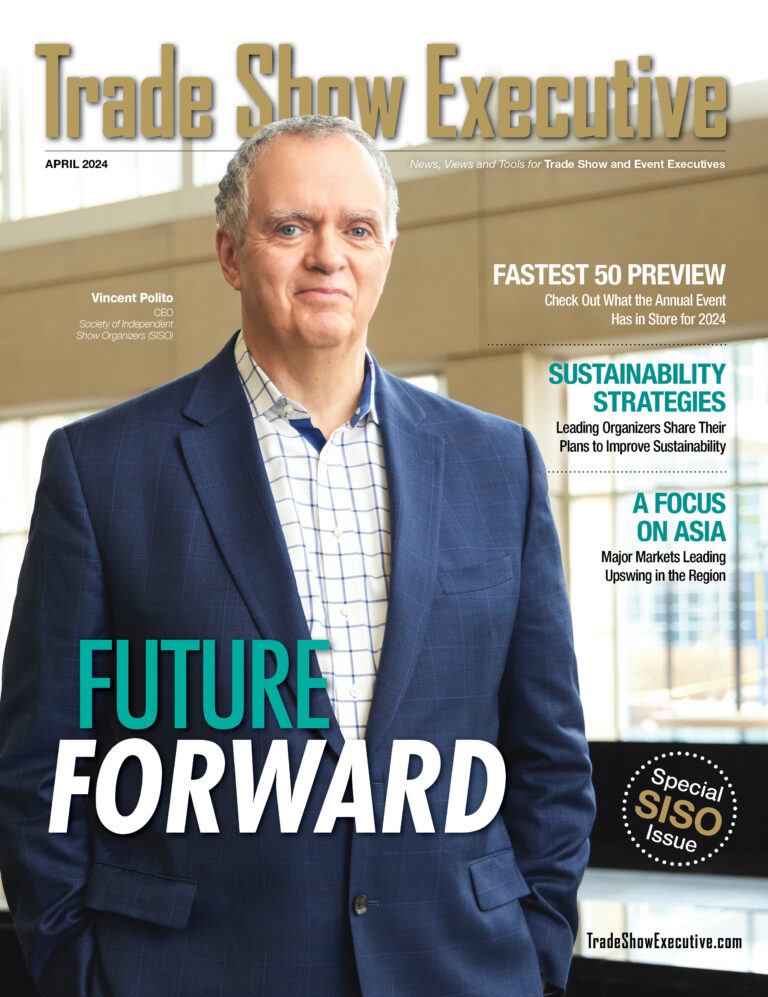
PARIS — Trade show data security is now at the forefront when it comes to organizers’ concerns. As trade shows were forced to go virtual during the COVID-19 pandemic, the amount of both data being collected by organizers snowballed. Personal data, such as names, addresses, etc., and behavioral data — including shows a person has attended in the past and past matchmaking data — have both proliferated. All this data now being generated by digital and hybrid events can provide powerful customer insights.
But with that opportunity come risks of increased legislation, litigation, security breaches, and not being able to meet customer expectations around privacy, said Kai Hattendorf, CEO and Managing Director of UFI, during a recent UFI Connects session on data ownership from the organizer’s perspective.
Related. UFI Updates Auditing Rules to Include Digital and Hybrid Events
“Trade show organizers, venues and service partners all need to protect that data that is entrusted to us,” he said. Trade show executives who provided their input on just how to make that happen included Lisa Hannant, Group Managing Director, Clarion Events; Douglas Emslie, Group CEO, Tarsus Group; Hervé Sedky, President and CEO, Emerald; Hugh Jones, CEO, Rx Global; and Charlie McCurdy, CEO, Informa Markets Global Exhibitions. Here are three key points they said every trade show organizer must understand:
- Barbarians at the gate. “Let’s be clear: The customers own the data,” said McCurdy. “They’re giving us consent to use the data…we are stewards of this data, and it’s our duty to keep it secure and use it appropriately for the benefit of customers in the marketplace they’re active in.” But there are, as Emslie said, “barbarians at the gate” — among them the plethora of tech companies now flooding the marketplace — who may be looking to use that data for their own purposes, regardless of what an organizer’s contract may say. Customers need to be able to trust that trade show organizers are able to properly manage and protect their data and can control what these third-party platforms do with it, panelists agreed. Said Emslie, “if there’s one takeaway for organizers…it’s that we are one data breach away from a disaster for our industry.” As one commenter pointed out, they used to wargame what would happen if LinkedIn moved into their space. And now that LinkedIn has invested in tech platform Hopin, that’s no longer quite so hypothetical.Hannant added that, even if you have a watertight contract, data may be being aggregated in multiple places that live outside of the organizer’s control. “Not being the data controller comes with many risks, both reputational and also legal,” she pointed out. And those risks will only increase over time as multiple organizers build communities with a globally aggregated data set. Even if the legal responsibility is outsourced to a third party, the reputational risk remains with the show organizer.
- Building trust. “Trust is earned over time” when it comes to customer data, said Sedky. As experts in this field, organizers have built-in credibility, which they must protect by building the data privacy infrastructure either internally or by working with outside experts. The intimacy of the data being collected underscores the importance of protecting that data now, and in the future as customer needs evolve. “Ultimately, customers want value, and they are entrusting us to use that data to create valuable solutions for them” as well as protect it, Sedky said. McCurdy added that, as long as customers understand organizers are protecting their data and using it in ways that are beneficial to their business, “we’re going to have a very productive relationship with attendees and exhibitors.”
- Creating standards. Hugh Jones emphasized that, moving forward, it will be key to develop industry-wide standards for data ownership and security. Standards will be key to being able to harness all this data to provide more personalized, impactful experiences, panelists said. Sedky said that Emerald has built a centralized data repository that now houses about 85% of the data from its shows and publications. “Now that it’s all in one hub, we can start to think about the types of solutions we want to build on top of it.”
Related. New White Paper Explores Re-imagined Business Events
As far as fighting the barbarians at the gate, the immediate plan is to follow up this webinar with a white paper outlining some of the key concerns and providing a battle plan that covers not just standards, but also compliance, audits, enforcement and the transparency needed to keep that all-important trust.
For more of the conversation, and a fascinating Q&A, the webinar is available free on demand at the UFI Connects website.
Reach Lisa Hannant at +44 (0) 20-7384-7700 or info@clarionevents.com; Hervé Sedky at (203) 840-5584 or Herve.Sedky@EmeraldX.com; Charlie McCurdy at +440 20 7017 5000 or Charlie.mccurdy@informa.com; Hugh Jones at +44 20 8271 2134 or hjones@reedexpo.com; and Doug Emslie at +44 208 846 2708 or demslie@tarsus.co.uk











